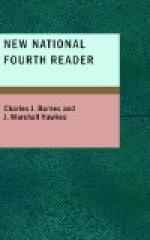* * * * *
Directions for Reading.—Read in a conversational
tone of voice, as in
Lessons I and II.
What word is emphatic in the third paragraph?
* * * * *
Language Lesson.—Syllabify, accent, and mark sounds of letters in the words, broken, packages, courage, polite.
Tell in your own words how the bean grew.
* * * * *
LESSON IV.
elf, a very small person; an unreal being.
vex, make angry; trouble.
pon’dered, thought about with care.
streak, line; long mark.
* * * * *
TO-MORROW.
A bright little boy with laughing face,
Whose every motion was full of grace,
Who knew no trouble and feared no care,
Was the light of our household—the
youngest there.
He was too young—this little
elf—
With troublesome questions to vex himself;
But for many days a thought would rise,
And bring a shade to the dancing eyes.
He went to one whom he thought more wise
Than any other beneath the skies:
“Mother,”—O word
that makes the home!—
“Tell me, when will to-morrow come?”
“It is almost night,” the
mother said,
“And time for my boy to be in bed;
When you wake up and it’s day again,
It will be to-morrow, my darling, then.”
The little boy slept through all the night,
But woke with the first red streak of
light;
He pressed a kiss on his mother’s
brow,
And whispered, “Is it to-morrow
now?”
“No, little Eddie, this is to-day;
To-morrow is always one night away.”
He pondered awhile, but joys came fast,
And this vexing question quickly passed.
But it came again with the shades of night:
“Will it be to-morrow when it is
light?”
From years to come, he seemed care to
borrow,
He tried so hard to catch to-morrow.
“You can not catch it, my little
Ted;
Enjoy to-day,” the mother said;
“Some wait for to-morrow through
many a year—
It always is coming, but never is here.”
* * * * *
Directions for Reading.—In reading poetry, pupils should notice the emphatic words, and give them proper force.
Example.
“Mother,”—O word that makes the home!—
“Tell me, when will to-morrow come?”
The two dashes in the first line of the preceding example are used instead of a parenthesis, and have the same value.
When there is no pause at the end of a line (see first line, third stanza), it should be closely joined in reading to the line which follows it, thus making the two lines read as one.




